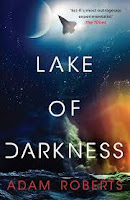Adam Roberts is quietly the most original science fiction writer of the past two decades. From societies with headless people to salt planet anarchies, domiciles in Earth's stratosphere to people who feed on light, secret Stalin science fiction projects to democratic armies (think about it), even to uncategorizable books like The This, Purgatory Mount, or The Thing Itself, Roberts has ensured that each of his books is radically different than anything else he's written, and if nothing else, will at least be an obtuse take on something the market takes for granted. Roberts latest offering Lake of Darkness (2024) is no different. Black holes, psychosis, AI, and human power hierarchies have never before been ingredients in such a stew.
The plot of Lake of Darkness is difficult to summarize in a neat paragraph. Structurally, it's the same story told twice in a row. For the first go around (the very short go around) the reader hears the tale of Raine, member of a nine-person, two-ship excursion to the edge of a black hole. Upon arriving at the event horizon, Raine does a most astonishing thing: he brutally murders all other crew members onboard. And when members of the other ship come board to investigate—after much philosophizing on the relative merits of such an attempt, he does the same. Mass murder virtually extinct in the story's utopian setting, the event is significant. It falls to a scholar of 20th century mass murder, a woman named Saccade, to get to the bottom of Raine's actions. In doing so, her story forms the second tale (the unpacked go around) of how Raine came to his actions.
Lake of Darkness is, in some ways, a more ambitious version of an earlier Roberts's novel Jack Glass from a plot perspective. Put simply, Roberts' injects this murder mystery with more intellectually stimulating material. This includes the nature of utopia, the potential (or lack thereof) of AI, astrophysics of black holes, human behavior (specifically status seeking), and psychopathy. Top this off with Roberts' delightfully muted sense of humor and a delectable take on Christian good and evil, and you have an enjoyable jaunt in and around 'sophisticated sf'.
I considered describing Lake of Darkness as the Trump book I've been waiting for but have yet to read given status and status-chasing are key themes of the novel. In a middle section, the unity of a group of scientists dissolves when one sure-minded scientist decides to turn her ego loose. The result is a twisting of commonly perceived reality and the group splits into two camps of belief. Sounds familiar, no?
In the end, Lake of Darkness delivers from Roberts yet another unique, unpredictable story, cut through with speculation and commentary on the 21st century state of human affairs. There are overt homages to Jules Verne, but the bulk of story explores one dark side of the human condition, cut through with a droll lack of emotion that prevents the story from having an overwhelming gravitas. And for astrophysics fans out there, Roberts has fun speculating on the reality and nature of black holes.


No comments:
Post a Comment